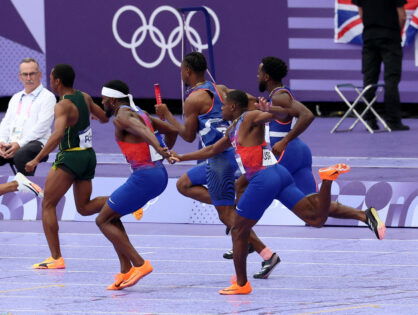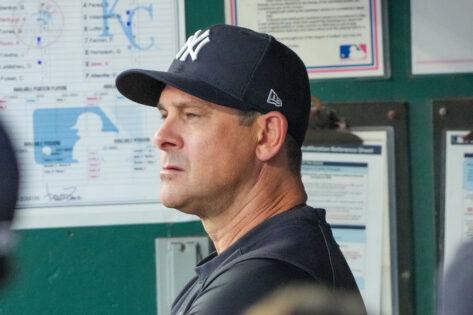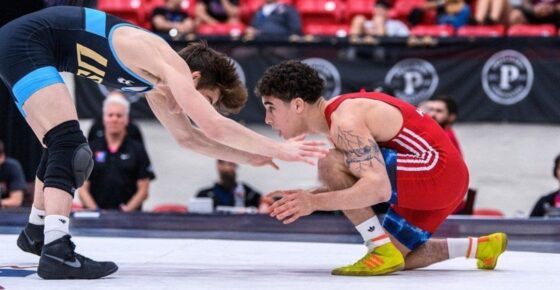The celebration on the backstretch had just begun. American flags, glittering in the Paris sun, were draped across the shoulders of a jubilant U.S. women’s 4x100m team. Meanwhile, barely 150 meters away, the men’s squad stood motionless, stunned, not by defeat, but by disqualification. Again. Kenny Bednarek had left prematurely, Christian Coleman couldn’t reach him in time, and what should have been a statement performance collapsed in a now-familiar calamity. As the women soaked in gold, the men watched their own relay dreams vanish before their race was even finished.
This wasn’t simply another flub on the global stage. It was a reminder of a chronic flaw that has plagued American men’s relays for decades. And while the conversation has grown tiresome in some circles, U.S. sprint legend Justin Gatlin is not among the indifferent. On the recent episode of Tidal League Podcast after the London Diamond League 2025, where Jamaica’s young men clocked 37.80s to not only win the event but qualify for the World Championships, Gatlin took a scalpel to the root of the issue. For him, it has nothing to do with talent.
“I think that they need to realize that they are a different kind of relay team than years past, right?” Gatlin said while in conversation with Rodney Green. “Having Usain Bolt on the end of multiple championship relays was great insurance no matter who else you had on that relay team… But the fact is now is like you have these younger guys who are coming up who are still trying to find themselves and trying to find their rhythm and their pace and they have to do it now as a whole team together.” In Gatlin’s eyes, the issue is not speed. It is the illusion that speed alone suffices.
The Jamaican quartet of Rohan Watson, Oblique Seville, Kadrian Goldson, and Kishane Thompson exhibited the precision Gatlin insists is non-negotiable. Their baton passes were efficient, unhurried, and composed. They ran as a unit, not as four men sharing a lane. Gatlin’s words, though aimed at the future of Jamaica’s squad, carried a shadowed warning for Team USA. He added, “We think it’s always about foot speed and time, and we work less on that synergy and handoffs and being precise… We can be way more consistent.”
This was not nostalgia for a bygone era, nor a swipe at younger athletes. It was a reminder from a man who anchored his country to gold. A relay, he stressed, is no longer a collection of stars sprinting solo. “Now it’s about synergy. Now it’s about precision,” stated Justin Gatlin. Without those elements, no measure of raw speed will matter. For the US, the lesson keeps arriving. Unfortunately, it often comes too late. After the Paris disaster, track legend Carl Lewis also reflected on the matter.
Carl Lewis calls for overhaul after U.S. men’s relay disaster in Paris
Carl Lewis did not temper his words. Minutes after the United States men’s 4×100-meter relay team was disqualified at the Paris Olympics, he delivered a sweeping rebuke of the program’s leadership, laying blame squarely on USA Track & Field’s handling of the event. “It is time to blow up the system. This continues to be completely unacceptable,” he posted on X, his frustration sharpened by decades of repeated failures in an event the U.S. once dominated. For Lewis, who has long argued for structural reform, this latest unraveling only underscored the systemic neglect he believes has corroded the relay program from within.
Paris 2024 Olympics – Athletics – Men’s 4 x 100m Relay Final – Stade de France, Saint-Denis, France – August 09, 2024. Kenneth Bednarek of United States, Kyree King of United States, Christian Coleman of United States ad Fred Kerley of United States react after competing. REUTERS/Phil Noble
The team, comprising Christian Coleman, Kenneth Bednarek, Kyree King, and Fred Kerley, entered the race as the fastest qualifiers and reigning world champions. Yet their performance unraveled almost immediately. The first baton exchange collapsed in disarray, and although they completed the race in seventh position, the result was ultimately erased from the standings. Coleman, involved in the mishandled handoff, told reporters, “We knew we had the speed to do it… but we are human beings, too.” His remarks, while earnest, pointed more to emotional injury than tactical miscalculation, a contrast to Lewis’s clinical indictment of the coaching staff.
In the hours leading up to the relay, Lewis had already signaled where his expectations lay. “If @TeamUSA wins all relays tomorrow, you talk to the athletes. If something happens and they do not sweep. ONLY talk to the coaches.” That framing now reads less as prediction than prophecy. In Paris, as another opportunity dissolved, Lewis did not parse words. His message was unmistakable: this is no longer a matter of bad luck or isolated error. It is the result of a broken system, and he wants it dismantled. Almost a year has passed since the Paris Olympics, and still, as it appears, Justin Gatlin too has to reiterate the thoughts of Lewis.
The post Justin Gatlin Names US Relay Team’s Biggest Problem Ahead of Tokyo Worlds appeared first on EssentiallySports.



